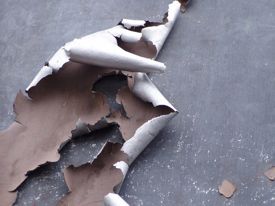Humidity and glass paint
A permanent bond discourages humidity
When paint cures, it hardens and becomes resistant to dirt, grease and contact damage. Ordinary paint doesn’t ever bond to glass, so it never really cures. Without curing, the paint will be subjected to contact damage, chemical damage from glues and damage from the humidity in the air. Ordinary paint will continue to absorb humidity, so not only will it not be cured, it won’t even stay dry. In a relatively wet place like a kitchen or bath, this will cause immediate problems.
If the paint is wet, it will peel away from the glass surface. The paint will bubble and flake – something you certainly don’t want in a kitchen! The relative humidity in the kitchen changes every time you cook something, so ordinary paint on glass will be subjected to these wide swings in humidity every day.
Humidity is a double-edged sword. Just as a room can be moister than average, it can also be drier than average. Ordinary paint in a place like a kitchen may be subjected to higher than average humidity, followed by lower-than-average humidity. Just as the paint absorbed moisture from the air, it will release moisture back into the air when the humidity drops. This will cause the paint to shrink and crack – something else you don’t want in the kitchen.
In short, applying ordinary paint to glass and then attaching the glass to the wall will not create the same effect as glass paint will, and it will create a mess in your food preparation area. The solution is to use true glass paint. Glassprimer™ glass paint forms a permanent bond to glass, and resists the effects of changes in humidity. When properly applied, glass paint will withstand the rigors of kitchen duty for years.
If you’d like more information about working with glass paint, or you’d like to buy glass paint, please visit our online store.
Photo Credit: Dave Gostisha, via FreeImages.com

